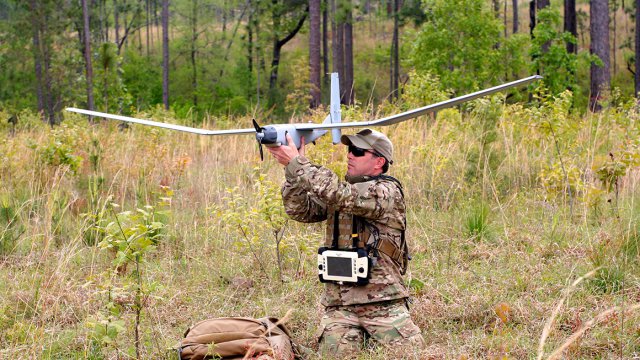 The US Army is field testing more than a dozen hand-launched ArrowLite unmanned air vehicles manufactured by Israel Aerospace Industries, which has long sought a foothold in the US military unmanned air systems (UAS) market.
The US Army is field testing more than a dozen hand-launched ArrowLite unmanned air vehicles manufactured by Israel Aerospace Industries, which has long sought a foothold in the US military unmanned air systems (UAS) market.
The company is hoping that a play for small-UAS business could open a door to future contracts.
In an interview with Flightglobal during the Association of the US Army’s (AUSA) annual exposition in Washington, DC, IAI North America chief executive Robert Foglesong said the market for medium-altitude, long-endurance (MALE) UAS is saturated with systems and crews returning home from the wars in Iraq and Afghanistan.
“The [US] Air Force brought lots of Predators and Reapers home and the [US] Army has got lots of Gray Eagles,” he says. “It became a much tighter market in the MALE UAV business.”
“We think the open field is still in the small UAV business,” Foglesong says.
IAI’s US subsidiary Stark Aerospace has developed several new unmanned systems that debuted at AUSA. ArrowLite is a 6lb (2.7kg) aircraft that can be carried in a large backpack. A single soldier can assemble the system in under 90s and launch it with one hand from a standing or prone position and expect 2.5h of endurance.
Stark was established in 2008 in order to create a “beachhead” in the US unmanned systems market, he says. The company initially was involved only in the defence market, but has begun to explore opportunities with commercial UAS applications.
The US military is currently putting 13 prototype ArrowLites, complete with electro-optical/infrared sensors and ground control stations, through an operational military utility assessment, Foglesong says. The design was developed in concert with the US Combating Terrorism Technical Support Office, and has fielded to special operations units, he adds.
“Israel has faced the same types of circumstances we’re now facing in the United States, but they’ve been facing it for decades.”
Foglesong points to the need for intelligence, surveillance and reconnaissance along US borders. The technologies, techniques and training that Israel has adopted over the years is applicable to the USA, as its military returns from foreign wars to focus more on domestic security, he says.
“One of our desires is to introduce a lot of the equipment and the training that the Israeli Defence Force and industry has responded to over the last several decades,” he says.
The company is also nearing the launch of a 11kg UAV that has electric engine nacelles that tilt like a Bell-Boeing V-22 Osprey. It can take off vertically and transition into more-efficient forward-flight.
Source: Flight Global
